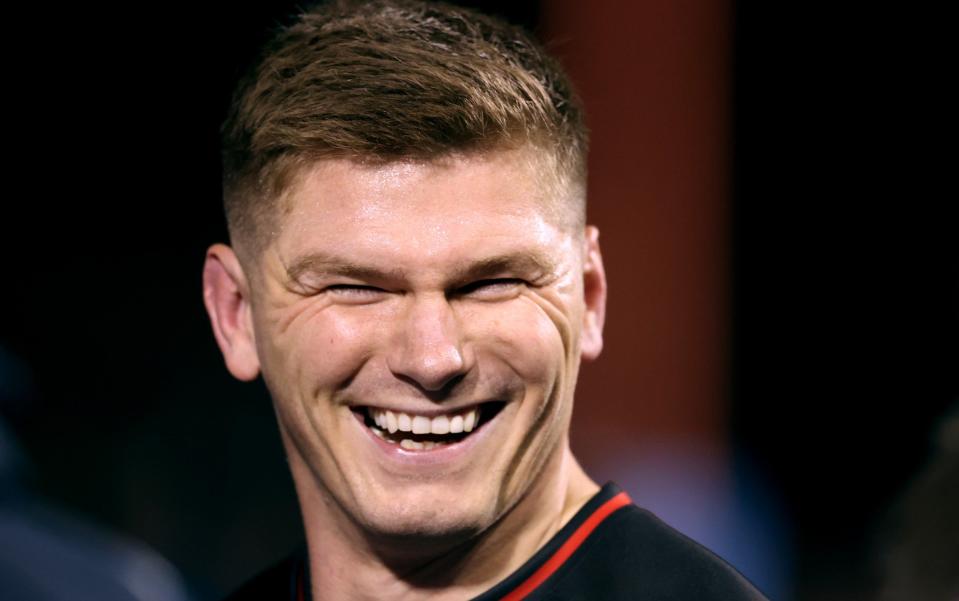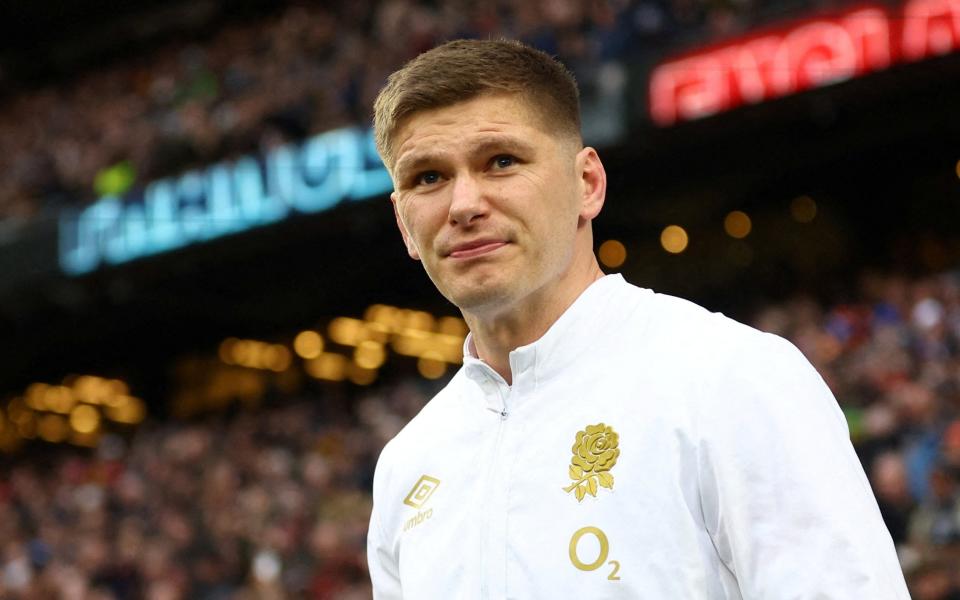Why Owen Farrell is still playing for Saracens but not England

The opening shots of the video footage from Pretoria show Owen Farrell, a beaming grin across his face and ball in hand (see below). One suspects the social media post by his club Saracens, with the message “settling right in” on Tuesday was not by chance. Earlier in the day his club had also posted a message with a photo of their captain looking down at the Saracens crest on his jersey.
The 32-year-old may have stepped back from Test rugby last week to protect his and his family’s mental health, but the projection suggests that bond with the club he first made his senior debut for just 11 days after his 17th birthday appears to be as strong as ever.
A week-long trip to South Africa to prepare for their Investec Champions Cup opener against the Bulls on Saturday has offered the perfect escape from the glare of the spotlight since his bombshell announcement, but the word from within the camp is that he is just as desperate as ever to deliver a big performance.
“He is our captain, he is our leader, someone who is respected by everyone at the club. To have him on the field, of course, is an enormous benefit,” said Mark McCall, Saracens director of rugby. “Not just to have him on the field, but to have him in the team room, in the meetings. His contribution is so enormous, and it is great to have him here with us.”
Settling right in 😁
#YourSaracens💫 #InvestecChampionsCup pic.twitter.com/QyVrqEg4j8— Saracens Rugby Club (@Saracens) December 5, 2023
It was McCall who came out with a strong defence of his captain last week, lambasting the criticism that has plagued Farrell’s career as “shameful”. McCall spoke almost like a father, pointing out that Farrell had been at the club almost half his lifetime.
It gave a glimpse into the culture at Saracens, where the player always comes first – a sentiment that strayed too far at times when they breached the salary cap, leading to their relegation in 2020. And yet the club has always insisted their success to that point was founded on more wholesome values, not least a spirit and culture that is often characterised by the keenness of their international players to return to club action when others may have been more equivocal.
The most recent example came with the footage of Jamie George and Theo Dan celebrating the club’s victory over Gloucester moments after England’s victory in the bronze final at the World Cup in Paris, which was quickly followed by Saracens’ England contingent returning to Premiership action en bloc to secure a thumping victory over Leicester the following weekend.
'No, no, genuinely; 24-3'.
Cameras just caught Jamie George informing Theo Dan of the Saracens-Gloucester score. pic.twitter.com/GfT5L1ld0M— Charlie Morgan (@CharlieFelix) October 27, 2023
Now, the fact that Farrell, who could be seen smiling and signing autographs ahead of Saracens’ defeat by Northampton at the StoneX Stadium last Saturday, feels able to play on for his club despite the off-field issues that have forced him to step away from international rugby, only serves to underscore that sentiment. The club has his back.
“I think what I’ve always found at the club is that people come first,” said McCall. “It is way, way more important than performance or results or outcomes.
“The people in the organisation and looking out for each other and caring about your team-mates, caring about the people that you work with is the most important thing. And I think that’s served us well down the years.
“It’s probably very easy to say that and very hard to explain what it actually looks like in reality, but I suppose when the big tests come and whether that was on the field or some of the off-field issues that we’ve had, I think you’ve seen the club get tighter together and look out for each other. I am so privileged to be part of this group of people, some of whom have been here for a very long time, some of whom are a bit more recent and are starting to get used to it.”
Neil Golding, the Saracens chairman, who was appointed in the aftermath of the salary cap controversy, provides a relatively fresh perspective to the culture, admitting he was struck by the bond within the squad when the club faced the ignominy of their salary-cap sanctions, including relegation.
“The general culture at Sarries is that genuinely they give a ‘s---’ about people. It is hard to see what the secret sauce is but it comes across all the time, right from the top all the way down in terms of being supportive,” said Golding.
“Owen is a very high-profile example of it, but if you work in an organisation which is successful and treat you well, it is almost like: ‘What is not to enjoy about it?’ Owen and the likes of Jamie [George] and Maro [Itoje] started off at the club as kids and grew up together, came through the ranks and are at the top of their game. They are there with their mates and treated properly.”

Golding recalls seeing tangible evidence of the tightness of this bond, when Farrell and the senior leaders held a meeting following confirmation the club would be relegated for their salary cap breaches.
“The senior players, led by Owen, all got together and decided that they would have a season in the Championship. Some like Ben [Earl] and Max [Malins] went out on loan because of the stage of the careers they were at, but the senior leaders effectively said they would take one for the team and play in the Championship, bounce back and show everybody that they didn’t win stuff because the club had breached the salary cap but because they were a tight group.
“One wonders if you would get the same response at a Premier League football team but these guys really wanted to sort of prove people wrong and so they come back even stronger. Mark and Phil Morrow [Saracens’ general manager] were the same. There was definitely a sort of Dunkirk spirit amongst the club at that point.”
If winning the Premiership last season proved that point, it also provides the context to explain why Farrell is happy to return to action for his club at a time in his career when the stresses of international rugby have taken their toll.
“Jamie George, Owen and Jackson Wray were young players when this project started in 2009-10 and they got the benefit of the wisdom of some of the senior players that were around then and were allowed to grow and develop at their own pace.
“They had lots of people in the senior player group looking out for them and the same is happening now. We have a group of 18-, 19- and 20-year-olds who have arrived at the club and they have senior players now who have a sense of duty to do the same and help and support people the way they were supported.”

 Yahoo Sport
Yahoo Sport 



































































